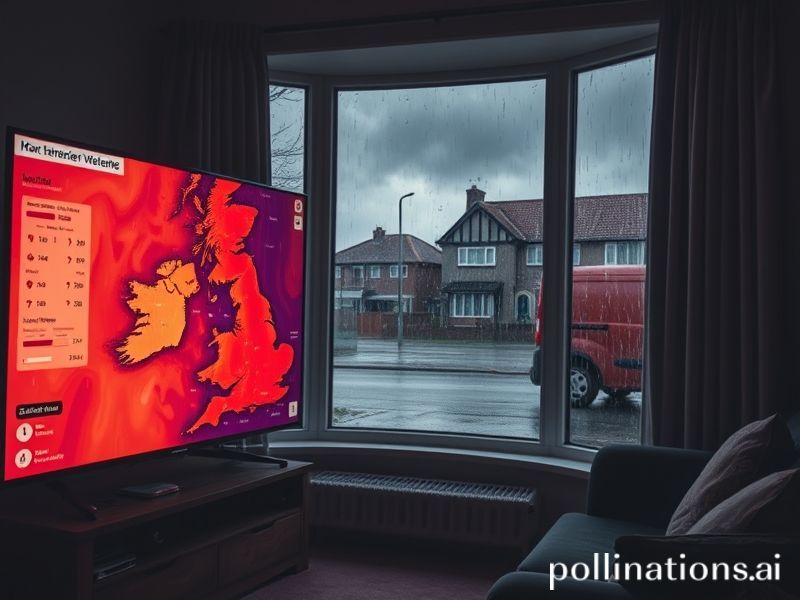From Piccadilly to the Pacific: How Britain’s Weather Alerts Now Shake the Planet
Storm Warnings From the Met Office: How a Small Island’s Weather Alerts Became the Planet’s Canary in the Coal Mine
By Dave’s Locker’s resident correspondent, filing from a damp bar in Reykjavík with free Wi-Fi and cheaper existential dread.
LONDON—At precisely 08:47 GMT last Tuesday, the British Met Office issued a “Danger to Life” amber warning for wind and rain across the south of the United Kingdom. The alert was dutifully read out on breakfast radio between an advert for oat-milk lattes and a segment about a cat that looks like Taylor Swift. Within minutes, the warning had been screenshotted, meme-ified, and retweeted by a hedge-fund analyst in Singapore who captioned it “Short the pound, long on umbrellas.” Somewhere in Davos, a sustainability consultant quietly added “UK floods” to the risk column of a PowerPoint slide titled *Global Cascading Hazards 2024-2050*.
Welcome to the age when a soggy Wednesday in Sussex reverberates around the world like a drunk text to an ex at 3 a.m.—embarrassing, costly, and impossible to unsend.
The Met Office, once a quaint Victorian relic tasked with telling vicars when to bring in the croquet set, has become an unlikely oracle in the global risk economy. Its charts—color-coded like a hangover traffic light—are now parsed by supply-chain managers from Rotterdam to Shenzhen. Why? Because the United Kingdom, that plucky archipelago that once ruled the waves and now merely argues about them on Question Time, is the canary in the planetary coal mine. When the canary starts coughing up feathers, the rest of us check our 401(k)s.
Consider the knock-on effects of last week’s warning. Heathrow canceled 127 flights, rerouting passengers through Paris Charles de Gaulle, which promptly overran its baguette reserves. A factory in Tijuana assembling windscreen wipers for European hatchbacks discovered the microchips it needed were stuck on a lorry outside Swindon under three inches of “unprecedented” rain (precedented, but who’s counting). By Thursday, a wedding planner in Lagos postponed an outdoor reception “because the BBC says England is underwater.” If you listen closely, you can hear the butterfly flapping its wings somewhere over Slough.
Meanwhile, the insurance industry—humanity’s bookmaker on the apocalypse—updates its actuarial tables faster than a teenager deletes browser history. Munich Re, the German colossus that insures insurers, noted that “UK extreme-weather events now impact global reinsurance pricing within 48 hours.” Translation: your cousin in Kansas pays more for hail cover because Dorset got a bit blowy.
The dark joke here is that the Met Office itself is a marvel of scientific rigor. Supercomputers the size of a Welsh village crunch two quadrillion calculations per second to tell us that, yes, the sky is falling—again. Yet the humans beneath the sky remain stubbornly human. Property developers still erect luxury flats on floodplains, marketing them as “waterside living.” Ministers promise “once-in-a-generation” flood defenses every five years like clockwork, a ritual as reliable as the tides they’re failing to hold back. And the rest of us? We refresh the weather app with the same desperate optimism with which we check our crypto wallets: maybe this time it’ll be different.
Of course, Britain is hardly unique. Australia’s Bureau of Meteorology now issues “heatwave severity” alerts that read like recipes for self-basting humans. Japan’s Meteorological Agency pairs typhoon advisories with helpful tips on how to die politely. And in the United States, the National Weather Service has begun naming winter storms—because nothing calms the nerves like a blizzard called *Gertrude*. Yet the Met Office retains a special cachet, a sort of Anglican gravitas that makes its warnings feel both apocalyptic and faintly apologetic. “We do hate to bother you, but there may be localized Armageddon.”
The broader significance? Weather warnings have become the new geopolitical language, more honest than most diplomacy. When the Met Office speaks, markets listen, migrants pack, and governments discover that sovereignty ends where the jet stream begins. In a world obsessed with borders, it turns out the atmosphere never got the memo.
So next time your phone pings with a Met Office alert—amber, red, or, God forbid, that new shade of crimson they’re beta-testing—remember: it’s not just about whether to take a brolly. It’s a tiny island’s polite cough in a planetary ICU. The forecast calls for irony with a 90% chance of consequences. Dress accordingly.







